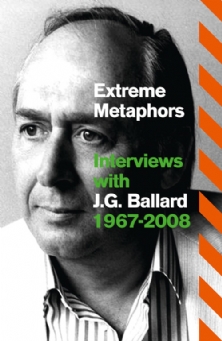When J.G. Ballard died in 2009, given the measurable impact and length of his career, two years shy of spanning a half century, it should have left a sizeable genius-shaped hole, if not in the global literary landscape, at least in the UK. And, yet, Ballard – and the majority of his novels and short story collections, save perhaps Crash which will be known to a great many by name only – remain an undiscovered country to the vast majority whom know little of the man other than what they were told in Empire of the Sun. (And many of those will likely be oblivious that Spielberg was selling them anything more than fiction.)
Whilst they remain – and are unlikely now to ever move away from being – fringe, or for want of a better word "cult", works Ballard’s novels do not exist in a vacuum: they have simultaneously affected and predicted the future, both of literature and of the society which that literature moves to represent. As testament to this, for the last four years, Simon Sellars, with co-editor Dan O’Hara, has been working on a fitting homage to the twentieth century’s most astute and most reluctant soothsayer: Extreme Metaphors: Interviews with J.G. Ballard 1967-2008 – a collection that burns so brightly with Ballard’s inquisitive, philosophical mind as much as a sense of the author’s own personal warmth that it makes not just a fitting tribute, but a blazing effigy.
Not to put too fine a point on it, but fans of Ballard who aren’t familiar with your work (and there will be some) might ask what it is that qualifies you, or your co-editor Dan O’Hara, as editors of the book over other candidates; some of the high profile interviewers whose work has been used, for example…
Simon Sellars: I guess I’ve got form. I’ve been publishing the well-known Ballard site ballardian.com for seven years, I’ve written several articles on Ballard for academic and non-academic publications, I interviewed him in 2006 and I wrote the foreword for the Greek publication of his autobiography Miracles of Life. Other than that, the book originated with me. I initially pitched the idea to Ballard’s then-agent in 2008 just before Ballard died, and then afterwards worked with Dan and the Ballard Estate on it. I asked Dan to become involved as he’d located some very obscure Ballard interviews and had translated them from their initial publication in French and German. These appear in the book as English translations for the first time, a major coup.
A collection of interviews like Extreme Metaphors is always going to prove interesting, but how much more information can it really provide than Ballard’s own memoir Miracles of Life or the quasi-autobiographical Empire of the Sun?
SS: Well, it’s not a memoir so it’s going to be very different from Miracles – and Empire is, after all, a novel. Extreme Metaphors is Ballard as philosopher. He does discuss his novels and short stories and the biographical details that everyone knows – most obviously his childhood in Shanghai and his adult life in Shepperton. But the conversations are also reports on what he sees as the dominant forces shaping an increasingly globalised, interconnected planet – and how these feed into his fiction. That’s where it gets interesting for me. Ballard was a formidable thinker – even a ‘futurist’ if you’re that way inclined – with a mind sharply attuned to shockwaves and currents in popular culture. He was a great conversationalist and in interviews would explore at length the subjects that interested him, especially the media landscape, in very accessible, jargon-free language.

So, beyond those biographical and bibliographical details, what is it that fascinates you most about Ballard?
SS: What I still find incredible after having read and re-read these interviews so many times is how prescient he was. Often when compiling the book, it seemed I could pick any number of current trends in popular culture and find forewarning of them there – sometimes in interviews from as long ago as the 60s. He anticipated the ‘ruins porn’ aesthetic in failed cities; the west’s increasing susceptibility to natural and manmade disasters; the global financial crisis; celebrity culture; end-state consumerism; surveillance and CCTV culture; the atemporality of late capitalism; the dominance of computers in everyday life; semi-sentient machine technologies (the New Aesthetic, perhaps?); the increasingly urbanised nature of the planet. He was uncannily accurate about new media, anticipating the rise of personalised, mobile technologies and the concurrent collapse in top-down media broadcasting – the conditions of social media, by any other name. The force of his predictions still blow me away and as a philosopher of technology and media landscapes he goes beyond McLuhan and Baudrillard, even though he shares commonalities with both.
For that very reason Ballard is often described as a ‘seer’ – his visions of the then-future are, as you say, often startling acute and frighteningly accurate – is that a title that he embraced, or a role that was ascribed to him but never fully accepted?
SS: The label ‘seer’ is media hyperbole. I believe Lynn Barber was the first to use it in relation to him; or rather her subeditor was, in a 1970 interview with Ballard entitled ‘Sci-fi Seer’. Then in 1996 Will Self asked Ballard about ‘the role of technology today’, qualifying it by saying ‘I am not asking you to play the Seer of Shepperton’. But as is the nature of these things, the press seized upon the term and, ignoring Self, insisted on dubbing him ‘the Seer of Shepperton’. This amused Ballard because, needless to say, he was no mystic. He simply knew where to look and had the intelligence to process the findings. So, whereas many science fiction authors of the 60s and 70s were still writing about outer space, he inverted the equation to write about ‘inner space’ – total immersion in mediated realities. Even a novel like Crash fits in with this: it takes place almost wholly within a tightly bordered milieu of motorway overpasses and service roads. That’s a technological landscape, a wraparound virtual reality as much as any cyberpunk invention, and it’s crucially important to the way Ballard wrote about cities and suburbs – as a science fiction of the everyday, of what he describes as ‘the next five minutes’ rather than the next 500 years.
The book has interviews with fairly prominent names – Will Self, John Gray, Iain Sinclair and David Cronenberg to name a few – but also some that are considerably less recognisable; how did you go about selecting which interviews would make it in to the finished product?
SS: We wanted to present a chronology to show the development of Ballard’s thought. And then to touch upon all the major phases of his career – his early science fiction, his experimental writing, his forays into graphic art, the Spielberg and Cronenberg films of his work, the separate controversies generated by Crash (novel and film), his later ‘subversive crime’ novels. The status of the interviewer was never really an issue, although we did, to some extent, aim to convey the esteem in which Ballard is held by including the interviewers you mention. We wanted also to show how Ballard was as much a part of the underground as the mainstream by including obscure interviews from long-defunct zines alongside newspaper interviews and conversations from commercial publications like Penthouse.
For people that aren’t already Ballard junkies – those who have only read one novel, who have tried and failed to get on with his work and those who are thinking of reading Ballard for the first time, for example – will Extreme Metaphors pique their interest on any measurable scale, or make Ballard’s novels more accessible or enjoyable when they do get around to it?
SS: I believe so. There’s a sense, especially in the 70s conversations, that Ballard used the interview situation as a kind of laboratory. He presented real-world case studies (say, video recorders becoming popular in the 70s); ran tests on them – that is, extrapolated extreme near-future scenarios (say, an imagined dystopia of disembodied virtual sex inspired by reading reports of people watching porno films on VCRs); and published the results in his writing (his savage, gory 1977 short story ‘The Intensive Care Unit’ follows precisely that VCR/sex/dystopia line of thought). Probably my favourite interview in the book is one from 1974 where he runs rings around the interviewer, Carol Orr, dazzling her with all manner of near-future situations as he works through the themes of his then-unpublished novel, Concrete Island. If you didn’t understand Concrete Island, the Orr conversation will probably enlighten you.
We avoided including too much discussion of Empire of the Sun, because Ballard even bored himself after talking about it for the umpteenth time. After Spielberg filmed Empire, it seemed that’s all anyone wanted to ask him about and I’ve read interviews where you can sense his frustration with it. Instead, we tried to get at least one sustained mention of each of his novels in the book, so you’ll find talk of such works as the much-maligned Hello America and the misunderstood Rushing to Paradise.
The book hasn’t received a great deal of press coverage in the UK – and your plea on Twitter for press in Australia suggests that’s not peculiar to Britain – which seems strange given Ballard’s place in twentieth and twenty-first century literature. Do you think perhaps the author is fading from the general cultural consciousness?
SS: It wasn’t a ‘plea’ – more an ironic acceptance of the fate Ballard suffers outside the UK, using my country, Australia, as an example. I wondered if anyone here would review the book, given our media’s traditional indifference to him. Let’s face it: he’s a cult writer, and aside from the brief window of fame bestowed by Empire, always has been, even in the UK. That in no way diminishes his importance. His influence is vastly more than the sales of his books might imply, well documented among the numerous practitioners of the arts who take him as inspiration; in that respect he’s the Velvet Underground of English letters. As to lack of press in the UK, I’m tempted to suggest that rather than Ballard ‘fading from the general cultural consciousness’, it’s more a case of the mainstream press fading from relevance, even though I know there are several UK newspaper reviews on the way. Unless you’re JK Rowling, it’s probably hard for any author to get a good run in the papers these days.
Meanwhile, everyone else just gets on with it, using the tools to hand – there’s been a strong buzz around the book on social media and that may well prove a more effective promotional tool than a review in the Guardian. Of course, given my earlier answer about the power of Ballard’s predictions about new media, I’d have to take that line, wouldn’t I? In fact, Ballard prepared me for this world. I owe him a lot.

You can read an extract from Toby Litt’s interview with J.G. Ballard, as it appears in Extreme Metaphors, here on The Quietus
Extreme Metaphors is out now on 4th Estate Books


